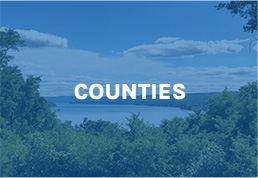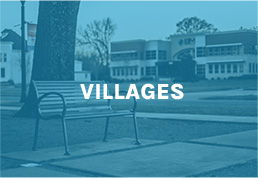Make the smart choice for your community’s future.
Is your municipality interested in becoming a Climate Smart Community? Great decision! Participating in this New York State initiative is a tangible way to preserve rich natural resources for the future, save your municipality money on utility costs, and increase eligibility for grant funding. Take a brief guided trip through the steps a municipality must complete to become certified.
Your pathway to getting certified as a Climate Smart Community:
1. Get ready.
The Climate Smart Community (CSC) program, administered by NYSDEC, works in partnership with the state’s Clean Energy Communities (CEC) program, administered by NYSERDA. Because points earned in key areas under CEC also count toward CSC – and vice versa – most municipalities need to work on both programs in tandem. Find out what to do next to coordinate your efforts.
2. Take the pledge & register.
Pledge to join the Climate Smart community program by passing a municipal resolution. Then choose a coordinator to sign up for the CSC portal, complete registration forms and upload the adopted resolution. In tandem, you should establish a task force to guide your community’s climate actions.
3. Set a goal & choose your actions.
Are you going for bronze…or for silver? In your CSC portal, review and select the actions your municipality wants to undertake to reach the required number of points, taking into consideration estimated costs and timelines that are provided. Start with mandatory and priority actions – then determine whether to tackle optional actions now, or revisit after certification. Find out what to do next to coordinate your efforts.
Bonus Level!
Gold level certification is still under development, but your municipality can earn extra points for innovation, whether by going above and beyond the actions outlined in the rating system or by taking a creative approach to an outlined action. You can also earn bonus points for performance by providing before-and-after measurements to show quantifiable reductions in greenhouse gas emissions and solid waste volume based on completed actions.
Explore the most popular actions by municipality.
4. Upload documentation.
As your municipality’s selected actions are completed, upload the required documentation in the CSC portal. A calculator in the portal will help keep track of your municipality’s progress toward certification.
5. Apply to get certified.
Once your municipality reaches the required number of points in the CSC portal, submit your application to become a certified Climate Smart Community. NYSDEC staff reviews applications quarterly, and once approved a certification remains valid for 5 years.
Timeline
After passing a CSC pledge, it takes most municipalities two to five years to complete actions and get certified. The good news? The more your municipality plans ahead – and the more action you’ve already taken – the faster the process! For some municipalities, certification can happen in as little as two months.
Power Up: Get free support.
Climate Smart Community Coordinators are available to provide free support to municipalities across the 10 regions of New York State through planning, education, and capacity building. Contact your regional coordinator.
Types of Grants Available
Municipalities can apply for grants to support Climate Smart Communities certification through NYSDEC, NYSERDA, the Department of State and the federal government. Through the CSC Grant Program, 50/50 matching grants are available to cities, towns, villages and counties for both implementation and certification. Municipalities do not need to be registered or certified as a Climate Smart Community to apply for a grant through the Consolidated Funding Application (CFA).
Department of Environmental Conservation Grants
Marine Habitat Restoration and Resiliency Grants
Lake Ontario Resiliency and Economic Development Initiative (REDI) Grants
New York’s Great Lakes Basin Small Grants Program
Department of Agriculture and Markets Funding Opportunities
Department of State Funding Opportunities
Hudson River National Estuarine Research Reserve Student Research Opportunities













